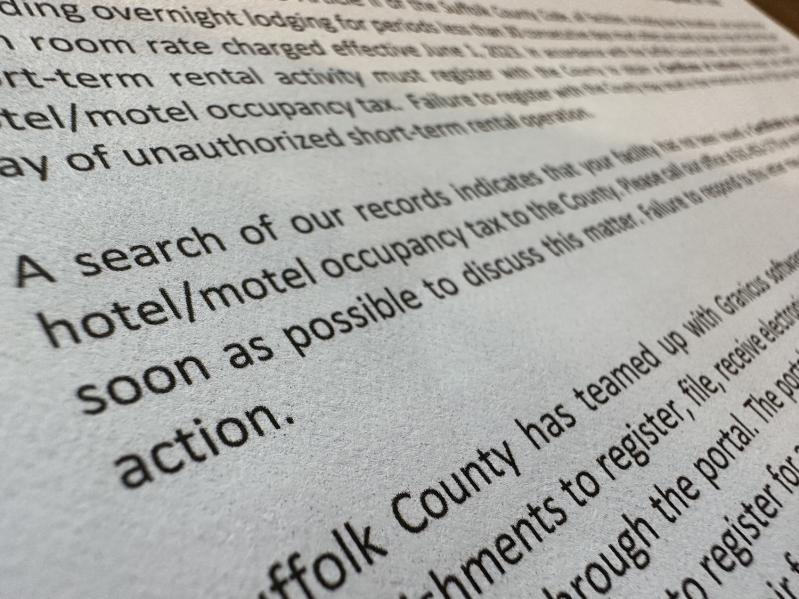Over the summer, many homeowners who rent their properties received letters from John M. Kennedy Jr., the Suffolk County comptroller, alerting them that they may be in violation of the Suffolk County Hotel and Motel Occupancy Tax.
“All facilities, including bed and breakfasts and tourist homes providing overnight lodging for periods less than 30 consecutive days must collect and remit a tax at a rate of 5.5 percent of the per diem room rate charged effective June 1, 2023,” read a section of the letter one resident received in mid-August.
The letter explained that owners of rental homes need to register with the county to obtain a “certificate of authority” to collect and remit the tax. Failure to register and collect the tax could result in a $50 per day fine or legal action.
“I have two people dedicated full time to sending out and responding to letters,” Mr. Kennedy said this week. “It’s a tedious process. As you might imagine, nobody runs to my office to enroll to pay what they perceive as a new tax. It’s a conversation.”
The 1,500 letters sent out since June resulted in approximately 50 to 100 new enrollments, according to Mr. Kennedy. The tax, he said, was to be paid by the consumer, not the hotel operators or people who rent their houses. “We’re not trying to play ‘gotcha,’ “ he said. “This is to encourage, promote, and enroll people in the tax system.”
The occupancy tax nearly doubled, from 3 percent to 5.5 percent on June 1, a hike that created an uproar among East End hoteliers since little if any of the tax stays local. Instead, most is earmarked for the Midway Crossing project, a $2.8 billion proposal that would span 179 acres and connect the Long Island Rail Road’s Ronkonkoma station to MacArthur Airport in Islip.
While there is nothing new about the county trying to collect the tax, the holes in its net have gotten smaller and perhaps it’s caught a few more fish, in part because of a new partner, Granicus, a software company that scours rental registries and about 70 websites in search of property owners who might be ignoring the tax.
In 2016, after the treasury and comptroller’s office split, the comptroller became responsible for collecting the tax. Mr. Kennedy says that in 2016, the county collected only $8 million. Just before the pandemic, that number had grown over 50 percent, to nearly $13 million.
As for new revenue the system might bring in, he was skeptical. “I’ve heard all sorts of numbers thrown out there. Maybe we can get it up a couple million, but up to $20 million? I don’t see it. You’re deluding yourself if you think we’re going to take a $12 million revenue and bump in $8 million.”
Jeanne Nielsen, the chairwoman of assessors for East Hampton Town, remembers a simpler time before Airbnb, VRBO, and absentee limited liability company property investors. “Historically, young families that were fortunate enough to buy a house out here would spend the summer with grandma and rent it out. It wasn’t on anyone’s radar because it wasn’t a party house with high turnover. Now those houses are being bought up by corporations. Maybe they own a half-dozen Airbnb properties, but they live in Europe. No one knows who really owns them.”
Michael Henry, who rented his Sag Harbor house for August, received the letter from the comptroller, and like Ms. Nielsen, said he hopes the L.L.C.s pay their shares, too. “If the county government can allocate resources to identify homeowners renting for additional income, I’d like to see more done to find properties owned by private investment firms that are not being used by local residents.”
“It’s an equality thing,” said Ed Mitchell, an auditor for the county who fields phone calls from residents who have received the letter. “VRBO and Airbnb have become very big players in the industry. We’ve been charging the Marriotts and the Ramadas, so why should some places get charged while others aren’t?”
Marcos Baladron, the East Hampton Village administrator, happens to live next door to a house that is often rented on a short-term basis. “I didn’t choose to live next door to an inn,” he said. “This is a residential neighborhood. Of course, these people should be taxed.”
While Leo Daunt, president of the Montauk Chamber of Commerce and the owner of Daunt’s Albatross, a downtown motel, agreed that owners of short-term rentals should be paying the county tax, he said the issue wasn’t so much who is paying and who isn’t but rather that Montauk needs more funding from the county tax for its environmental infrastructure and cultural and historical organizations.
“In Montauk we’re one big team. The fight is with Suffolk County and getting that fair share of the tax out here. I’m curious to see how much the percentage of that tax comes from Montauk as more Airbnbs contribute as well. As it gets more lopsided, it only strengthens our argument to send some of that tax back to us to address our infrastructure needs.”




